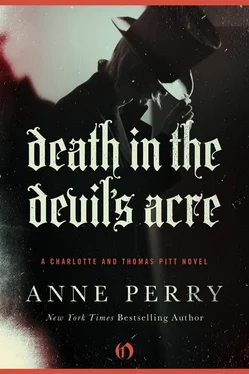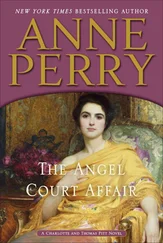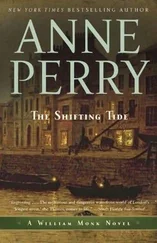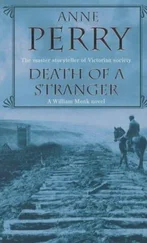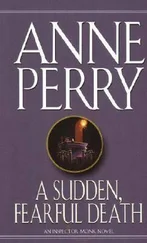Anne Perry - Death in the Devil's Acre
Здесь есть возможность читать онлайн «Anne Perry - Death in the Devil's Acre» весь текст электронной книги совершенно бесплатно (целиком полную версию без сокращений). В некоторых случаях можно слушать аудио, скачать через торрент в формате fb2 и присутствует краткое содержание. Жанр: Исторический детектив, на английском языке. Описание произведения, (предисловие) а так же отзывы посетителей доступны на портале библиотеки ЛибКат.
- Название:Death in the Devil's Acre
- Автор:
- Жанр:
- Год:неизвестен
- ISBN:нет данных
- Рейтинг книги:4 / 5. Голосов: 1
-
Избранное:Добавить в избранное
- Отзывы:
-
Ваша оценка:
- 80
- 1
- 2
- 3
- 4
- 5
Death in the Devil's Acre: краткое содержание, описание и аннотация
Предлагаем к чтению аннотацию, описание, краткое содержание или предисловие (зависит от того, что написал сам автор книги «Death in the Devil's Acre»). Если вы не нашли необходимую информацию о книге — напишите в комментариях, мы постараемся отыскать её.
Death in the Devil's Acre — читать онлайн бесплатно полную книгу (весь текст) целиком
Ниже представлен текст книги, разбитый по страницам. Система сохранения места последней прочитанной страницы, позволяет с удобством читать онлайн бесплатно книгу «Death in the Devil's Acre», без необходимости каждый раз заново искать на чём Вы остановились. Поставьте закладку, и сможете в любой момент перейти на страницу, на которой закончили чтение.
Интервал:
Закладка:
“Certainly, sir.” Mullen pulled the bell rope and, when the footman answered, requested that a pot of tea be brought, with two cups. He would not have presumed to take refreshment with a gentleman caller, and a tradesman would have been sent through the green baize door to the kitchen. But he considered Pitt to be roughly his social equal, which Pitt realized was something of a compliment. A butler was in many senses the real master of a household, and might rule a staff of a dozen or more lesser servants. He might also have greater intelligence than the owner, and certainly inspire more awe from his fellows.
“Have you been with Dr. Pinchin long, Mr. Mullen?” Pitt began conversationally.
“Eleven years, Mr. Pitt,” Mullen replied. “Before that I was with Lord and Lady Fullerton, in Tavistock Square.”
Pitt was curious about why he had left an apparently superior employment, but was unsure how to ask him without giving offense. Such a question, as well as being against his regard for the man, would be professionally foolish at this point.
Mullen supplied the answer of his own accord. Perhaps he wished to clear himself from suspicion of incompetence. “They took the habit of going to Devon every winter.” A shadow of distaste crossed his face. “I did not care for the travel, and I have no wish to remain idle in an empty town house with a caretaking staff for several months of each year.”
“Indeed,” Pitt agreed with some sympathy. An estate in the home counties would be an entirely different thing, with hunt balls, shooting parties, and guests for Christmas, no doubt. But a retreat to the silence of Devon would be a form of exile. “And I should imagine Dr. Pinchin was not an uninteresting employer?” he said, trying to probe a little deeper.
Mullen smiled politely. He was far too honorable to repeat the vast and intimate knowledge he had acquired of the Pinchin household. Butlers who betrayed that trust were, in his opinion, contemptible and a disgrace to their entire profession.
He misunderstood deliberately, and both of them knew it. “Yes, sir, although not a great deal of his practice was conducted from this house. He has offices in Highgate. But we have had some distinguished gentlemen here to dine, from time to time.”
“Oh?”
Mullen repeated the names of several surgeons and physicians of eminence. Pitt made a mental note of their names, to call upon later for whatever they might add to his picture of Hubert Pinchin, although he knew from past experience that all professionals seem to defend their colleagues, even to the point of ridiculousness. However, there was always the hope of stumbling upon some personal or professional jealousy that might loosen a tongue.
He learned from Mullen a little more about Pinchin’s habits, particularly that he quite frequently returned home very late in the evening. It was not unknown that he should be out all night. No explanation was offered other than the discreet supposition that illness does not confine itself to convenient hours.
A few moments later, the lady’s maid knocked on the door. Her mistress was ready to speak to Mr. Pitt, if he would care to come to the breakfast room.
Valeria Pinchin was a woman of Wagnerian stature, broad-bosomed, blue-eyed, with a sweep of fading hair above her wide forehead. She was dressed in unrelieved black, as became a new widow in the deepest mourning, not only for the untimely death of her husband but the appalling notoriety of its nature. Her face was pale, and set in grim and defensive determination. She looked at Pitt warily.
“Good morning, ma’am,” he began with suitable reverence for the occasion and some genuine pity. “May I offer my sympathy in your bereavement?”
“Thank you,” she replied, with a very slight sniff and a lift of her powerful chin. “You may sit down, Mr.-er, Pitt.”
He took the chair opposite her across the table. She sipped at tea without offering him any. After all, he was an extremely distasteful necessity, part of the trappings of the sordid disaster that had overtaken her-like the ratcatcher, or the drainman. There was no need to treat him as a social equal.
“I’m sorry, ma’am,” he began again, “but I am obliged to ask you a number of questions.”
“I can be of no help to you whatsoever.” She stared at him, bridling at even the suggestion. “You cannot imagine I know anything of such an unspeakable-” She stopped, unable to find a word extreme enough.
“Of course not.” She was not a woman Pitt found it easy to like. He had to force to his mind some of the other shocked people he had spoken with, their various ways of protecting their wounds.
Mrs. Pinchin was slightly mollified, but still her eyes glittered at him and her black-beaded bosom rose and fell with indignation.
“You can help me to learn a great deal more about your husband,” he said, trying again. “And therefore whoever might have believed him an enemy.” He wanted to be as courteous as possible, but ultimately the facts must be pursued to their logical end. Hubert Pinchin had been murdered. Someone had believed he had reason; a simple robber does not emasculate his victims.
She started to say something, then changed her mind and took another sip of tea.
Pitt waited.
“My husband was …” She was obviously finding it difficult to express her thoughts without betraying a part of her life that was far too private-and too painful-to be acknowledged, let alone paraded before this-policeman! “He was an eccentric man, Mr. Pitt,” she said. “He chose to practice medicine among some very peculiar people. I hesitate to say ‘unworthy.’” She sniffed. “I do not wish to be hard upon the unfortunate, but he could have had an outstanding career, you know. My father”-her chin jutted forward-“Dr. Albert Walker-Smith. No doubt you have heard of him?”
Pitt had not, but he lied. “A very famous man, ma’am,” he agreed.
Her face softened a little and Pitt feared for a moment that he would be called on to make some relevant comment. He had not the faintest idea who Albert Walker-Smith had been, except that obviously he was the man Mrs. Pinchin wished her husband could have lived up to.
“You said Dr. Pinchin was eccentric, ma’am,” Pitt said. “Was that true in any way other than not pursuing his career to its best advantage?”
She crumpled a napkin in her large hands. “I am not sure what you mean, Mr. Pitt. He had no unfortunate habits-if that is what you imply!” All the half-guessed-at aberrations of masculinity, practices her woman’s ignorance conjured from the darkness of imagination, hovered behind her words.
Pitt looked at her hopelessly. She was so armored in dignity and so conscious of the formalities of grief that he knew he would accomplish nothing with these predictable questions. Her mind was running in channels as entrenched as those of an old river falling to a long-predestined sea.
“Did he like Stilton cheese?” he asked instead.
Her thin eyebrows rose and her voice was hard. “I beg your pardon?”
He repeated the question.
“Yes, he did, but I find that offensively trivial, Mr. Pitt. Some insane creature has attacked and murdered my husband in the most”-tears filled her eyes and she swallowed-“the most unspeakable manner, and you sit here in his house and ask if he cared for cheese!”
“It is not irrelevant, ma’am,” Pitt replied with an effort at patience. She could not help herself: Social values and dignity were her only defense against such enormous fears. “There were crumbs of Stilton cheese on his clothes.”
“Oh.” She apologized stiffly. “I beg your pardon. I suppose you know your trade. Yes, my husband was very fond of the table. He always ate well.”
Читать дальшеИнтервал:
Закладка:
Похожие книги на «Death in the Devil's Acre»
Представляем Вашему вниманию похожие книги на «Death in the Devil's Acre» списком для выбора. Мы отобрали схожую по названию и смыслу литературу в надежде предоставить читателям больше вариантов отыскать новые, интересные, ещё непрочитанные произведения.
Обсуждение, отзывы о книге «Death in the Devil's Acre» и просто собственные мнения читателей. Оставьте ваши комментарии, напишите, что Вы думаете о произведении, его смысле или главных героях. Укажите что конкретно понравилось, а что нет, и почему Вы так считаете.
